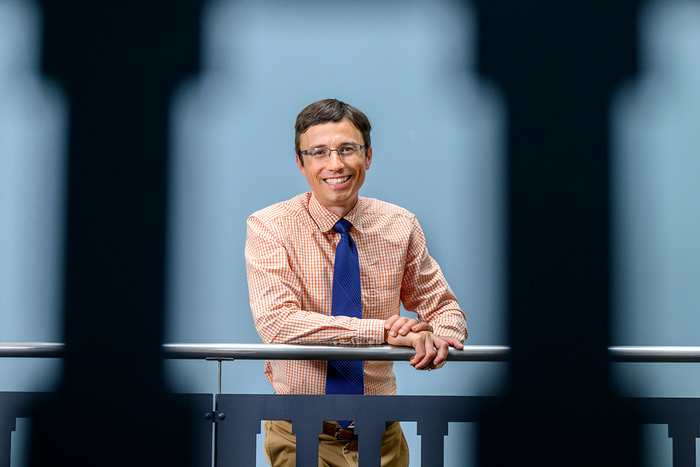CHAMPAIGN, Ill. — Gratitude has been a trendy sentiment in recent years – sparking an industry of journals, knickknacks and T-shirts touting thankfulness as a positive force in individuals’ lives.

Credit: Photo by Fred Zwicky
CHAMPAIGN, Ill. — Gratitude has been a trendy sentiment in recent years – sparking an industry of journals, knickknacks and T-shirts touting thankfulness as a positive force in individuals’ lives.
New research suggests that gratitude from one’s partner may be a powerful tool for couples as well, increasing relationship satisfaction and commitment while protecting couples from the corrosive effects of ineffective arguing and financial stress.
Individuals who feel appreciated by their partners have better-functioning relationships that are more resilient to internal and external stressors, both in the moment when the appreciation is expressed and over the long-term, said researcher Allen W. Barton, a professor of human development and family studies at the University of Illinois Urbana-Champaign.
Over a 15-month period, Barton’s team examined the effects that expressed gratitude – conveying appreciation to one’s partner – and perceived gratitude – feeling valued and appreciated by one’s partner – had on the relationships of 316 African American couples.
“This study was really motivated to understand gratitude in relationships and if it can protect couples from challenges and hardships, be it negative communication or broader factors like financial strain,” Barton said.
“Much of the prior research looked at the relational effects of expressing gratitude, but one could make the argument that feeling appreciated by one’s partner is important, too. And we tested both to see whether one was more influential for couple relationships than the other,” Barton said.
The majority of those in the study were middle-aged and lived in small communities in rural Georgia. While most of the participants were employed, about 65% of the couples had joint incomes that were less than 150% of the federal poverty level and could be classified as working poor, Barton said
The total number of children residing with the participants ranged from one to eight, averaging three. The married couples had been together about 10 years while the unmarried couples had been cohabiting nearly seven years when the study began.
Published in the Journal of Social and Personal Relationships, the current study builds on a 2015 study Barton led that examined the effects of financial distress on marital quality. That study, published in the journal Personal Relationships, considered only perceived gratitude and included predominantly white, middle-aged and more highly educated couples.
“In the current study, we wanted to examine the effects of both perceived and expressed gratitude and whether perceived gratitude works similarly with a different demographic population,” he said.
Over the 15-month period, the couples were surveyed three times about their arguing and conflict resolution, their expressions of gratitude to their partner and their levels of perceived gratitude from their partner. The participants also reported on their current levels of financial strain.
Respondents rated their satisfaction with their relationship, ranging from perfectly happy to very unhappy; the relationship’s level of stability, as measured by thoughts or discussions about breaking up; and their confidence in their future together.
Respondents completed the surveys again eight and 15 months after the initial assessment so the team could measure the effects of both forms of gratitude over time.
“Our main hypothesis was that perceived gratitude from one’s partner would have what we call stress-buffering effects – that it would protect couples from the declines in relationship quality that typically happen when you have negative communication or when you have higher levels of financial strain,” Barton said. “Expressed gratitude really hadn’t been looked at before, so we had no hypotheses with it – our work was more exploratory.”
Individuals in the sample with higher levels of expressed and perceived gratitude were more satisfied with their relationship, the team found. These individuals had greater confidence in its future and reported less instability, such as discussions or thoughts about breaking up.
When the team looked at protective effects, they found that higher levels of perceived gratitude buffered against the stresses of both financial strain and ineffective arguing, and these couples “did not exhibit as strong of declines in relationship satisfaction or confidence, or the increases in instability that we typically see” with these types of stressors, Barton said.
“Even if the couple’s negative communication increased – provided they still felt appreciated by their partner – their relationship quality did not decline as much over time,” he said. “That becomes really important because not every couple is going to be great at communication, particularly when things get heated or intense, or hit a home run with resolving conflicts.”
The protective effect of perceived gratitude applied both in the moment – when the respondent felt appreciated by their partner – and across time, Barton said.
No protective effects were observed for high levels of expressed gratitude, however.
While there is no single surefire way of making one’s partner feels appreciated, Barton suggested: “Be sure to make compliments that are sincere and genuine. And ask your partner if there are any areas in which they feel their efforts aren’t being appreciated or acknowledged and start expressing appreciation for those.”
The research was supported by the National Institute of Child Health and Human Development, and by a grant from the National Institute on Aging to co-author Steven R.H. Beach. He is the Regents Professor of Psychology and director of the Center for Family Research Clinical Program at the University of Georgia.
Additional co-authors were August Ida Christine Jenkins, a visiting postdoctoral research associate; then-graduate student Naya C. Sutton; and graduate student Qiujie Gong, all of the U. of I.
Journal
Journal of Social and Personal Relationships
DOI
10.1177/02654075221131288
Method of Research
Survey
Subject of Research
People
Article Title
The protective effects of perceived gratitude and expressed gratitude for relationship quality among African American couples
Article Publication Date
4-Oct-2022
COI Statement
The researchers report no conflicts of interest.




